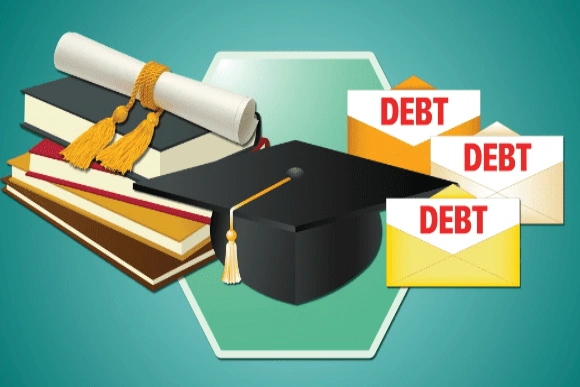First, remember that there’s nothing inherently wrong with borrowing money to invest in your future. It’s just that an early part of your education should consist of some lessons about ways to manage student debt well. You can make good decisions about borrowing for school that will enable you to reap the rewards.
Suggestions to Help You Learn to Manage Your Student Loan Debt
Before you can manage your student debt, you need to gather enough information to make good choices about your educational goals in the first place. Obviously, the longer you need to spend in school, the more potential income you may give up because you delayed starting your career. Sometimes, you will gladly make this sacrifice to gain the skills to pursue your dream job and hopefully, eventually earn a high income.
Start figuring out what kind of investment you can make in yourself by estimating:
- The amount of money that you need to borrow
- How long your education will take
- Your potential income after you begin your career
As a fairly extreme example, consider that average doctors must attend medical school after college. These days, doctors graduate with an average balance of about $200,000 for medical school debt, not even counting any undergraduate loans they might have accrued. At the same time, the Department of Labor says doctors can expect to make an average salary of about $208,000 a year. No doubt, the investment of time and money presents a large burden but can also offer the rewards of a good job with a lifetime of high earnings.
Most of you probably aren’t planning to study to become doctors. Choosing fast-track training for another good career in medicine might offer you a good option. For instance, you could train for pharmacy tech careers at CCI Training Centers in as little as seven months. The Department of Labor estimates average salaries of over $32,000 and a rapidly growing demand.
Plus, the demand for qualified pharmacy technicians in Texas is expected to increase by over 25 percent within five years, which increases your chances of earning a good income that you can use to easily manage a modest student loan. The flexible courses allow you to manage work and other family obligations while attending school, hands-on training, and even an externship. You still may need to borrow some money to pay for classes; however, you won’t need to borrow any sum close to $200,000.
Repaying Student Debt
After you finish school and begin your new career, you’ll have to repay your student loans. Just as you made choices about taking out debt and pursuing a particular educational program, you may also have options about the kinds of debt you accept and your prepayment plans.
These are some typical types of student loans:
- Federal loans: You begin the process of applying for federal loans by completing the FAFSA, or Free Application for Student Aid. This application may help you qualify for other kinds of student aid. Here, you may qualify for direct loans from the government and private loans that are subsidized by the government. Your parents may also qualify for PLUS loans.
- Private loans: Some financial companies offer private student loans with their own terms and qualification standards. You may or may not need a cosigner, such as parents, with good credit. Your school may also have its own loan program, and that’s something you should ask about.
Direct loans give you a grace period of nine months between finishing your program and needing to begin repaying them. Subsidized loans have a grace period of six months. While PLUS loans don’t offer any grace period, they can usually be deferred as long as the student is at least a half-time enrolled student. Private lenders will each have their own terms but typically structure their loans to meet the needs of students.
What Happens if You Can’t Pay Your Loan Back?
No matter which option you choose, you need to plan to make timely payments when they’re due. Failure to meet the terms of your loan can damage your credit and increase the amount you owe because of penalties and interest. However, everybody understands that people do encounter setbacks in life.
Generally, you can request forbearances, additional deferments, or a restructured payment plan under certain circumstances. Still, getting the loan entirely canceled or forgiven is a rare occurrence that’s granted only under unusual circumstances. While you might get a lender to work with you, you will almost always still need to make payments.
Federal Loan Repayment Options
For federal loans, these are common repayment options:
- Standard: Lenders generally calculate standard payments that will free you of student debt within 10 years or less. Typically, your standard payments will be the highest monthly option, but you can pay the money back the fastest and pay less interest overall. You’re also usually free to pay your loan back faster to reduce interest even more.
- Graduated and extended payment plans: A graduated plan also lasts a maximum of ten years; however, the payments start off lower and increase every two years. An extended plan may give you up to 25 years to repay the entire loan. These flexible options may help you manage your debt better, but you’ll pay more interest and end up paying more in the end.
- Income-based repayment plans: Some plans base repayment amounts upon actual income. You might also need to declare a financial hardship to qualify for some of these options. Typically, you’ll still face limits by the amount of time you can carry the loan. If your loan is ever canceled, the IRS might treat the forgiven debt as income.
Most of all, it’s important for you to understand how much you’re borrowing, the interest rate, the potential amount of monthly payments, and your repayment options under various circumstances. You can find some free online calculators that will help you estimate payments, and your school’s financial aid office should provide you with guidance and resources.
How Student Loans Can Help You Invest in Your Future
Like any other loan, know that you will need to make a commitment to repay student loans. If it takes you some time to repay the balance, you could also pay a considerable amount of interest. That means you will probably end up paying back somewhat more than you borrowed. You may already understand this, but some younger students haven’t had much experience with managing personal finance. That’s why they’re important things to emphasize.
At the same time, you shouldn’t let responsibility for student debt stop you from obtaining the education that you need to embark upon a rewarding career. People borrow money for investments all the time, and what’s a better investment than one in your future? You should just factor in the amount you need to borrow, your potential income after finishing your program, and how long you will need to repay the debt. That will give you the solid information that you need to decide where to study and how much to borrow.
At CCI Training Center, we will help you explore a variety of ways to fund your education, including grants, loans, and other kinds of financial aid. Employers have confidence in our training programs, just like we have confidence in you to make good choices for your future. To invest in a quality training program, email or call our Dallas or Arlington campuses.






